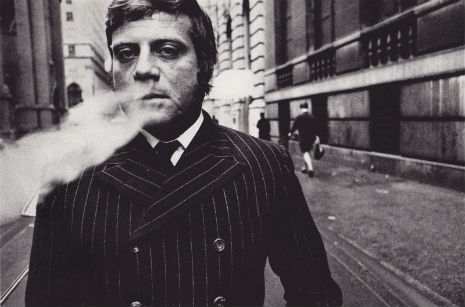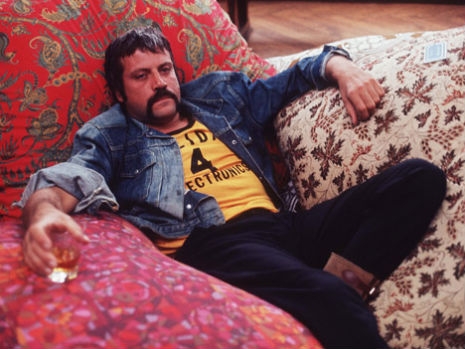
Since I couldn’t have a dog when I was a child, it became my ambition to turn into a werewolf. Vampires were dull and superstitious. Frankentstein’s monster was clumsy and no good with kids. The Invisible Man appealed, though he wasn’t too good at small talk, and being invisible could get awfully cold. My short list, therefore, was pared down to Dr. Jekyll and Mr. Hyde and the werewolf. Both had interesting dichotomies, but where Jekyll’s was about repressed guilt and sexuality, the lycanthrope was driven by a powerful animal nature, which I saw as my untamed spirit.
That summer, when I was six, I became a werewolf for a week or so, and howled at the moon.
I learned my lupine behavior from Henry Hull in The Werewolf of London, who was then my favorite lycanthrope, putting a beefy Lon Chaney Jr.‘s Wolfman into second place. This was, of course, until I saw Oliver Reed possessed by a silvered moon in The Curse of the Werewolf.
Reed had the werewolf routine down pat. He knew all the moves, and did a fine line in shirt-shredding and wet-eyed remorse. I quickly realized that being a werewolf wasn’t as much fun as being an actor, and I began to follow Reed’s on-screen career.
I caught-up with his early swash-buckling double-bills at the Astoria cinema, where I also saw Reed as the definitive Bill Sikes in Oliver!, then as a comic and unlikely brother to Michael Crawford in The Jokers, and finally as animal-loving POW taking an elephant to safety across the Alps in Hannibal Brooks.
Reed had a joy for living that radiated form the screen, and unlike all the other fodder on offer, Ollie’s films were different, quirky, and, most importantly, fun.
It was through Reed that I arrived at Ken Russell, the man who made me aware of just how brilliant and original cinema could be.
Looking back, Reed’s films were all peculiarly British. Moreover, during the 1970s, as every other Brit actor fled the country’s eye-watering rate of taxation (75%), it seemed like Reed was only actor keeping British cinema alive.
Ultimately, it proved a losing battle, as the American summer blockbuster brought an end to individuality, intelligence and the art of the cinematic auteur.
Of course, things could have been much different, if Reed had gone for the Hollywood lifestyle: those big budget movies, the box office success, and a life by the swimming pool sipping Evian water.
It wasn’t so far fetched, as at the height of his fame, in the 1970s, Reed was offered two major Hollywood movies that would have changed his career for good.
The first was The Sting, where he was to be the villain, Doyle Lonnegan; the second was Steven Spielberg’s Jaws, in which he was to play the wise, old fisherman, Quint.
Reed turned them down, and both of these roles went to Robert Shaw.
Going to Hollywood, Reed later admitted, “might have made all the difference,” but it wasn’t in his nature, as he explained to the actress, Georgina Hale:
”You know, Georgie, I could have gone to Hollywood but I chose life instead.”
Interesting how he made a difference between “Tinsel Town” and “life.”
But “life” had to be paid for, and over the next two decades, Reed made a small library of bad B-movies that hardly used his talent and did little for his reputation.
When his brothers, David and Simon asked Oliver to go to Hollywood, Reed would always shake his head and reply:
”I don’t think I can do it. I don’t really want to do it.”
Reed’s lack of confidence stemmed from his dyslexia, which saw him damned as dunce throughout his school years, and led him to doubt his own intellectual potential. He covered-up this lack of confidence with drink. Lon Chaney once advised his son to find a movie role he could make his own. Junior soon hit on The Wolfman and became a star. By the 1980s, Reed was making the role of a drunk his own. It was a performance that shortchanged his talents.
Robert Sellars in his authorized biography on Reed What Fresh Lunacy Is This? notes an exchange in an early Reed movie, which parallels the actors own fears.
There’s a scene in The System where Jane Merrow’s character asks Oliver’s Lothario of a seaside photographer why he stays in a small town, thinking him to be the type who would have moved on to a bustling city long ago.
Asked if he likes living in the town, he replies, ‘No, not particularly.’
‘Then why stay?’
‘Perhaps I’m a little nervous of going anywhere bigger.’
Reed was a star, it’s just the movies that got small. But in his work/life balance, Oliver probably got it right. He achieved a memorable body of work, with at least a dozen important films; and he lived a life of excess that became the envy of beer-bellied frat boys and suburban barflies.

On British TV back in the 1980s, there was a show called In at the Deep End, where user-friendly presenters Paul Heiney and Chris Serle were given the challenge of mastering a different profession every week. These jobs ranged from working as a chef, becoming a female impersonator, making a pop promo (for Banarama), and acting in a movie.
In 1985, Heiney was given a bit part in the Dick Clement / Ian La Frenais movie Water, a flop that starred Michael Caine, Valerie Perrine and Billy Connolly. With no acting experience, Heiney sought out the advice of Oliver Reed, who gave impromptu acting lesson of how to be a bad guy.
As Heiney later told Robert Sellers:
’[Reed] was wearing a heavy army overcoat,’ says Heiney. ‘Like the ones the Russian army wear, and he said there was nothing underneath. I had no reason to disbelieve him. He was wearing a pair of wore-rimmed spectacles; one of the lenses was cracked. He had a sort of look of death about him, although I’m sure that was put on, and he had in his fist a pint mug with this clear, colourless liquid in it which he said was vodka and tonic, and I’ve got no reason to doubt that, either. Clearly he’d decided from the outset that he was going to play the bad man every inch of the way. Come in, sit down, shut up, don’t sit there, all that kind of stuff, and he was clearly enjoying it. And I wasn’t enjoying it.’
The advice Ollie gives in the interview is like a master class in how to play a villain on film. His big thing was not to blink: bad men do not blink. ‘You don’t see a cobra blink, do you?’ he says.
The next thing was the voice. Villains don’t shout, they don’t need to. Dangerous men have a great silence and stillness about them.
The one thing that’s missing from this clip is Reed’s finally, knowing wink to camera. But it’s all priceless, and shows a flash of Reed’s talents.